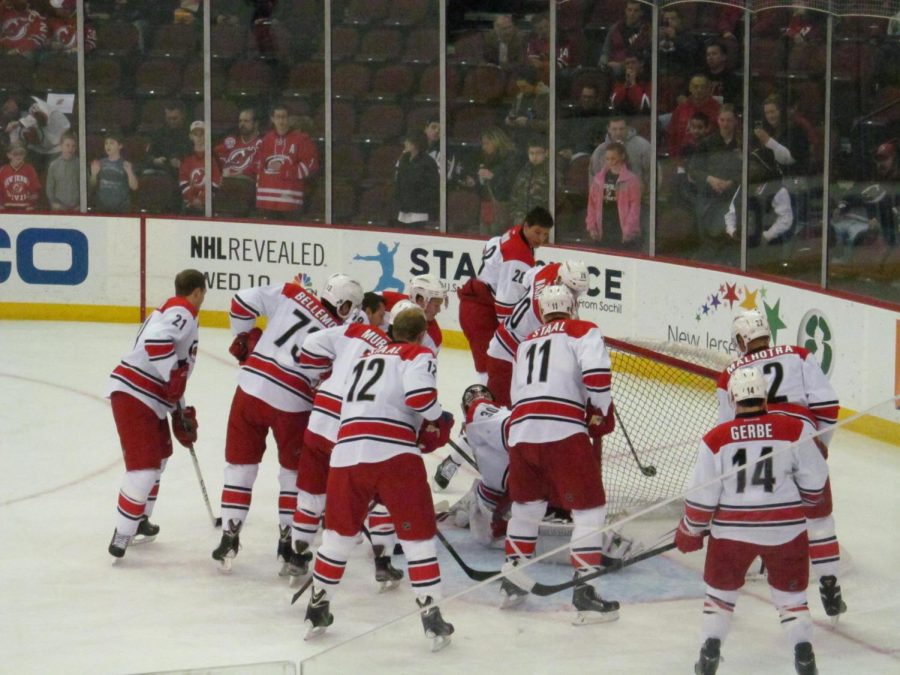How NC has become a hub for hockey culture

More stories from Seth Steiner
Image sourced via Creative Commons
Hockey has become quite a popular sport in NC, and much of this is thanks to the state’s only NHL team, the Hurricanes. Since the Hurricanes came to NC in 1997, the sport has become a mainstay and the team, a household name.
Hockey, in essence, has always been thought to be a sport limited to cold climates, namely Canada. However, that isn’t true. Thanks to the expansion of hockey throughout the world, and especially the United States, areas like North Carolina, NC, where hockey would’ve never been thought to thrive, have proven the critics wrong time and time again. Since the Hartford Whalers moved to Raleigh in 1997 and became the Hurricanes, NC has grown to become quite the hockey hotbed, with people of all ages being able to play and enjoy the sport.
In the last 26 years, the Hurricanes have had a consistent –and rather dedicated– fanbase. As with most teams, the Hurricanes have had high points, such as winning the Stanley Cup in 2006 over the Edmonton Oilers, and a fair amount of low points, like their nine year playoff drought from the 2009-10 season up to the 2017-18 season. Yet, the fans stuck around, even if in diminished numbers. Nowadays, the team has been competitive, qualifying for the Stanley Cup Playoffs every season since 2018. Success like this is always a good thing, especially for attendance and profits. In general, right now is a positive time for the Carolina Hurricanes.
Now, it’s easy to see why the Hurricanes are good; they finished their regular season with 113 points. That’s good for 2nd place in the National Hockey League, NHL, behind the Boston Bruins, the winningest team in NHL regular season history. However, the success experienced in Carolina wouldn’t be possible without a few key players. Guys like Martin Necas, Sebastian Aho and Andrei Svechnikov have all contributed significantly to the recent success the team has seen, with Aho and Necas leading the team in points, Aho with 67 points and Necas with 71 points. Their defense has also been locked-in, with notables such as Brent Burns, Brett Pesce and Jaccob Slavin each playing fantastic shut-down defense in front of Antti Raanta and Frederik Andersen, who have both posted .900 plus save percentages, with Raanta earning four shutouts this season. Overall, the team plays a very complete game in all areas of the ice, and their success really is no wonder. It’s also no wonder that their attendance has been in the top half of the NHL, averaging 99.6 percent attendance during the 2022-23 regular season.
Seeing as the team has played well, attendance and profits have also seen improvements. In February, the Hurricanes hosted the NHL’s Stadium Series, a regular hockey game played in an outdoor venue. In this case, Carter-Finley Stadium, home to NC State University’s football team. The game was a total success, with the stadium being completely sold out to the 56,961 fans in attendance, making it the most fans ever at a hockey game in NC, and the 17th most attended game of all time. This game also got the attention of fans all over the country, with ESPN reporting that an average of 1.1 million people were watching the game. All of this attention also led to incredible merchandise sales figures, with the total online sales being higher than any other Stadium Series game.
All of this evidence points back to the fact that the Hurricanes have proven to be a very successful team on all fronts, and this really does make a huge difference in the Raleigh area. Many people have found themselves watching hockey, which not only generates ad revenue for the league, but also creates new fans and shapes a new era of the sport. More and more kids have gotten into the sport, with new teams starting every year in the Triangle area. Just recently, a new push has been made to expand hockey to new levels, like a high-school league. The idea has not been officially sponsored or approved by Wake County, but the interest for a league is truly there. This league wouldn’t match the likes of states such as Minnesota’s high school hockey leagues, but even a small league would be fantastic for the growth of the sport. Whether this league thrives or not is unsure at this time, but just the simple fact that there’s interest proves that NC has indeed become a real hockey market.




